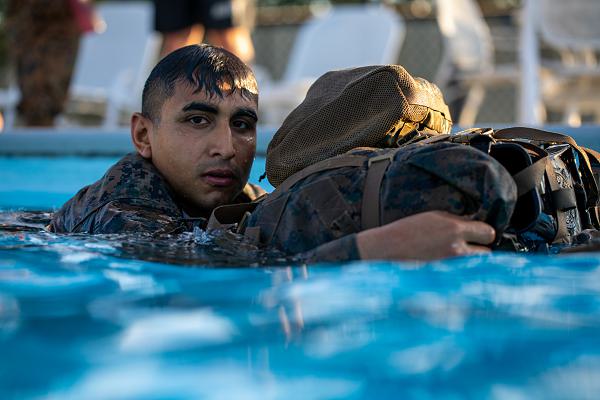
Camp Shelby, Mississippi. (May 15, 2024): Force Recon Marines are among the best spies… and killers in the world. In this photo by Corporal JVonnta Taylor, Lance Corporal Anthony Silva, a basic infantry Marine with 3rd Force Reconnaissance Training Platoon, 4th Marine Division, participates in a water survival screening as part of the grueling Recon Physical Assessment Test (RPAT). Force Reconnaissance Marines supply military intelligence through deep reconnaissance and perform direct action raids during large-scale operations. Through its Force Recon Battalions, the Marines are building warriors capable of spying on enemy forces, the terrain and their activities without being detected yet are highly capable of bringing the fight to the enemy.
Often called Green operations, Force Recon troops collect military intelligence by observing, identifying, and reporting adversaries’ activities to commanders in real time. The units also penetrate deeper into enemy territory than other special operations forces, well outside the protective artillery umbrella of the fleet.
They also mount Black operations where the Force Recon operators actively seek contact with the enemy. Depending on the situation, Recon Marines can direct naval fire or conduct direct infantry action in maritime raids of enemy vessels. Recon Marines also employ counter reconnaissance to frustrate the enemy’s scouting efforts against friendly forces.
To become a Recon Marine, the road is exceedingly difficult with a failure rate of fifty percent in some classes. To begin with, a Marine is in better shape than the average service member. For regular duty, they must pass a physical fitness test that is the toughest of all the services. The test includes longer runs, tougher calisthenics, and difficult agility tests like dragging people to safety. To try out for Force Recon, you must be a much better than average Marine.
The process begins with the Recon Physical Assessment Test (RPAT), a grueling five-week program of exercises, swimming, and rucking that requires next-level fitness. Marines must master the 500-meter swim, pushups, crunches, and a twelve-mile ruck march. They must also pass the bruising USMC obstacle course twice for time.
If they survive the RPAT, students head to the Marine Corps School of Infantry West at Camp Pendleton, California for the Basic Recon Course. Here students are given basic knowledge in mountaineering, land navigation, basic knots, and water survival training.
Today, Force Recon Battalions are strategically located around the world to give Marine Commanders real time intelligence and a direct-action tool simultaneously.


